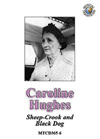
CAROLINE HUGHES - Sheep-Crook And Black Dog
Musical Traditions MTCD365-6
As a child growing up on the farm, I was fascinated by the gypsies who camped annually on a wide verge up the road when it was time to hoe the root crops, and a picture of the older lady who seemed to be in charge of a mass of children (while most of the parents were hoeing in the fields) stayed in my mind. She seemed very firm and a bit frightening! This was the Hughes family and the lady was “Queen” Caroline.
I never heard her sing, but I did acquire Peter Kennedy’s recordings of her, many years later. I was unaware that Ewan MacColl and Peggy Seeger had recorded her in 1962 and again in 1966, some two years before Kennedy’s recordings. The timescale is significant in that Caroline’s health was deteriorating and along with it, so was her singing ability. These earlier recordings have now been “cleaned up” discerningly and issued by Rod Stradling’s Musical Traditions label and make fascinating listening. Musical Traditions concentrate on the less commercial end of the market, acknowledging that their audience will be small, but well aware of the importance of making recordings such as these available. We owe them a great deal for that and so will succeeding generations of singers. In my view, this is one of their best.
So what do you get for your money? Well, there are two CDs, totalling nearly two and a half hours’ listening and a staggering 91 tracks, plus a 46 page booklet that is a mine of information and background on the singer and her songs. This is one woman’s repertoire that has been sympathetically recorded by two collectors who very obviously gained the trust of this Gypsy Queen and had the tenacity to return at a later date. All the songs are transcribed in the booklet and appear with Rod’s notes and cross-references to other singers and sources. If there seems to be a very heavy reliance on quoting Roud numbers, this is merely because Roud is the nearest we get to an exhaustive gauge of a song’s distribution. The notes are leavened by the author’s opinions and reactions to the songs he’s writing about and it all makes interesting reading.
With regard to the songs themselves, there are a large number of jewels here, as well as a lot of fragments of other songs and further recordings that seem to be composed entirely of “floating” verses, and there are hours of fun to be had just trying to guess where the floaters originated. The voice is strong and confident and at times she’s obviously singing to impress (more so than on the Kennedy tape). The inclusion of all the incidental sounds of life on a gypsy camp, plus the comments from other family members, give a real atmosphere. The breadth of Caroline’s repertoire is staggering, ranging from Child ballads to material that wouldn’t be out of place late at night in a rugby club and taking in Irish and American songs – one song from the USA was composed as recently as 1930.
There are versions of a large number of songs popular across the British Isles as well as others that seem to be the unique preserve of the travelling community. In addition, there are a few songs from Caroline’s husband William and from a daughter, as well as a couple from her brother-in-law Henry (who I know was recorded in the late 1980s). The overall impression (for it’s almost impossible to select individual highpoints from such a rich vein of song) is of a courageous woman, with strong beliefs and no fear of hard work, whose singing commanded considerable respect from her extended family. Many of them learned songs from her – I’ve heard a few of her grandchildren sing – and for all of them, singing was a regular occurrence, to the degree that it wasn’t always necessary for an entire song to be sung; the salient verses would prompt a picture of the all-important story in the listeners’ minds, and “new” songs seem to have been created by plucking verses from different stories. None of this helps in the preservation of the texts of older songs, but does give a sort of accelerated impression of what happens to some degree in the wider tradition. What we have here is a slice through the geology of singing, frozen at one point in its development, and as such it is immensely absorbing. There’s scope for endless speculation here: for example, where did her songs come from? Were they from her mother or her father’s side, or both? The Hughes family always had a reputation for being particularly clannish, so was there much repertoire picked up from other travellers, or even from gorgios?
If you’re interested in the large repository of traditional material that’s come down through the travelling community, these recordings will fascinate you. If that world’s not one you’ve visited, then I suggest you might consider getting this package. You’ll be opening a treasure trove.
John Waltham
| Buy
this CD online from The Listening Post The Listening Post is the CD mailorder service of The Living Tradition magazine. This album was reviewed in Issue 102 of The Living Tradition magazine. |

